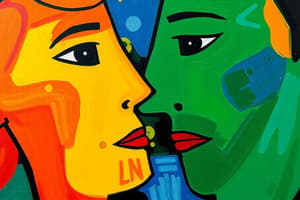Podcast
Questions and Answers
What are the various subsystems of culture mentioned in the text?
What are the various subsystems of culture mentioned in the text?
Language, Religion, Food, Arts, Customs and traditions, Values and beliefs
Who emphasized the economic underpinnings of culture, with class struggles shaping cultural expressions?
Who emphasized the economic underpinnings of culture, with class struggles shaping cultural expressions?
Karl Marx
According to Pierre Bourdieu, what is the source of social power related to culture?
According to Pierre Bourdieu, what is the source of social power related to culture?
Cultural capital
Which theorist emphasized the importance of understanding cultural differences and similarities, leading to the concept of cultural relativism?
Which theorist emphasized the importance of understanding cultural differences and similarities, leading to the concept of cultural relativism?
What did Erving Goffman's dramaturgical approach emphasize about social interaction?
What did Erving Goffman's dramaturgical approach emphasize about social interaction?
What is culture in the context of sociology?
What is culture in the context of sociology?
Who coined the term 'culture' and how did he define it?
Who coined the term 'culture' and how did he define it?
Why is culture considered essential in human society according to sociology?
Why is culture considered essential in human society according to sociology?
What are some examples of elements encompassed by culture?
What are some examples of elements encompassed by culture?
What does the term 'culture' encompass beyond material elements?
What does the term 'culture' encompass beyond material elements?
Flashcards are hidden until you start studying
Study Notes
Title: Unraveling the Fabric of Human Society: Sociology and the Study of Culture
Introduction
Sociology, a vibrant and interdisciplinary field, examines the way human societies function, evolve, and interact. As a rich and diverse discipline, it encompasses a wide range of subtopics, one of which is culture. In this article, we will delve into the fascinating world of sociology, specifically focusing on the subtopic of culture, its definitions, significance, and the contributions of key theorists.
What is Culture?
Culture refers to the collective values, beliefs, behaviors, customs, and traditions shared by a group of people. It encompasses both tangible and intangible aspects, such as language, religion, cuisine, arts, music, and more. Culture serves as an essential aspect of human identity, shaping our perspectives, shaping our interactions, and defining our social roles.
Culture in Sociology
Sociologists have long recognized the importance of culture in shaping human society. Anthropologist Edward Tylor, who coined the term "culture," defined it as "that complex whole which includes knowledge, belief, art, morals, law, custom, and any other capabilities and habits acquired by man as a member of society." This definition highlights culture as an all-encompassing concept that goes beyond material elements to encompass the very essence of human social life.
Culture and its Subsystems
An important aspect of culture is understanding its various subsystems, such as:
- Language: The way we communicate through spoken and written word, which plays a significant role in shaping our perceptions and understanding of the world.
- Religion: The shared beliefs and practices that provide a moral framework and a sense of meaning and purpose.
- Food: The customs and preferences surrounding diet, cooking, and consumption, which reflect cultural identity and values.
- Arts: The creative expressions that reflect cultural values and myths, including music, dance, film, literature, and visual arts.
- Customs and traditions: The practices and behaviors that define social roles, rituals, and ceremonies within a culture.
- Values and beliefs: The shared principles and ideals that shape individual and societal behavior.
Key Theorists Shaping the Study of Culture in Sociology
- Karl Marx: His dialectical materialist approach emphasizes the economic underpinnings of culture, with class struggles shaping cultural expressions.
- Max Weber: His ideal type methodology emphasizes understanding culture as a set of shared meanings, symbols, and values that create and shape social action.
- Clifford Geertz: His interpretive approach focuses on the "thick description" of cultural practices, emphasizing the importance of understanding the subjective meanings behind cultural expressions.
- Franz Boas: His anthropological approach emphasizes the importance of understanding cultural differences and similarities, leading to the concept of cultural relativism.
- Mary Douglas: Her symbolic interactionist approach emphasizes the cultural meanings behind social categories and practices, highlighting the relationship between culture and power.
- Erving Goffman: His dramaturgical approach emphasizes the performative nature of social interaction, with cultural rules guiding social behavior.
Culture and Power
Culture is not merely a set of shared values and beliefs; it is also a vehicle through which power is exercised and maintained. Sociologist Pierre Bourdieu argued that cultural capital, or the possession of cultural knowledge and tastes, is a source of social power. In this sense, cultural expressions serve as a means of reinforcing and challenging social hierarchies and ideologies.
Conclusion
Culture is an essential component of human society, shaping our identities, beliefs, values, and behaviors. As sociologists, we can better understand the complex dynamics and issues within our societies by examining culture and its various subsystems. By exploring the rich history and diverse perspectives within sociology, we can deepen our understanding of culture's profound influence on human social life.
References
- Bourdieu, P. (1984). Distinction: A Social Critique of the Judgment of Taste. Cambridge, MA: Harvard University Press.
- Douglas, M. (1970). Purity and Danger: An Analysis of Concepts of Pollution and Taboo. London: Routledge.
- Geertz, C. (1973). The Interpretation of Cultures. New York: Basic Books.
- Goffman, E. (1959). The Presentation of Self in Everyday Life. New York: Doubleday Anchor Books.
- Marx, K. (1845). The German Ideology (Chapter 3). In V. I. Lenin (Ed.), Collected Works (Vol. 5, pp. 36–86). Moscow: Progress Publishers.
- Weber, M. (1947). The Methodology of the Social Sciences. New York: The Free Press.
Studying That Suits You
Use AI to generate personalized quizzes and flashcards to suit your learning preferences.




